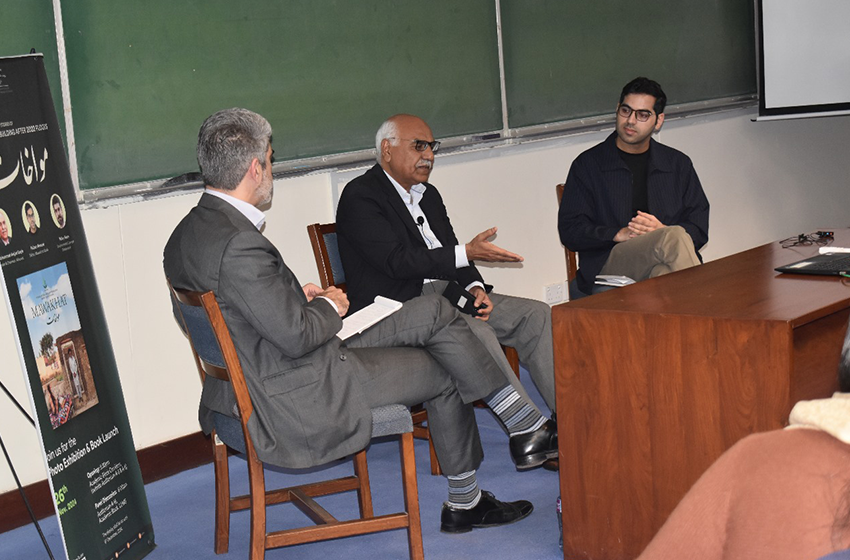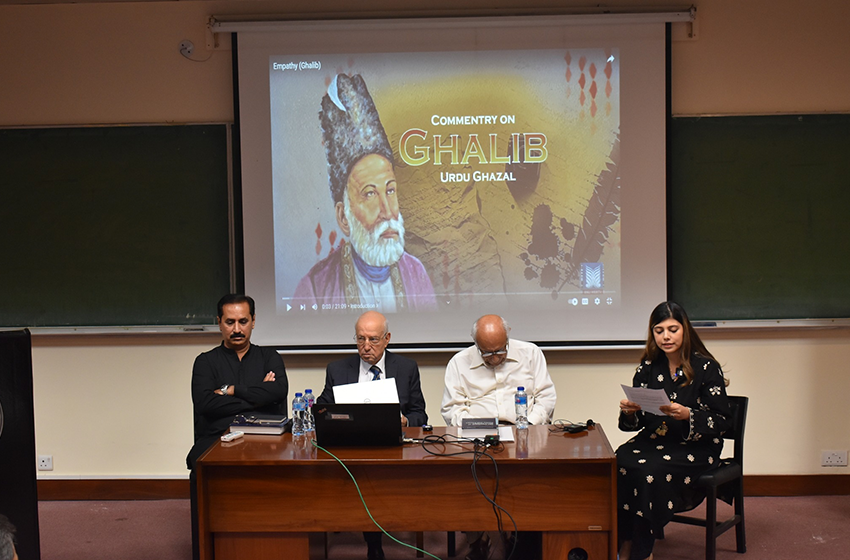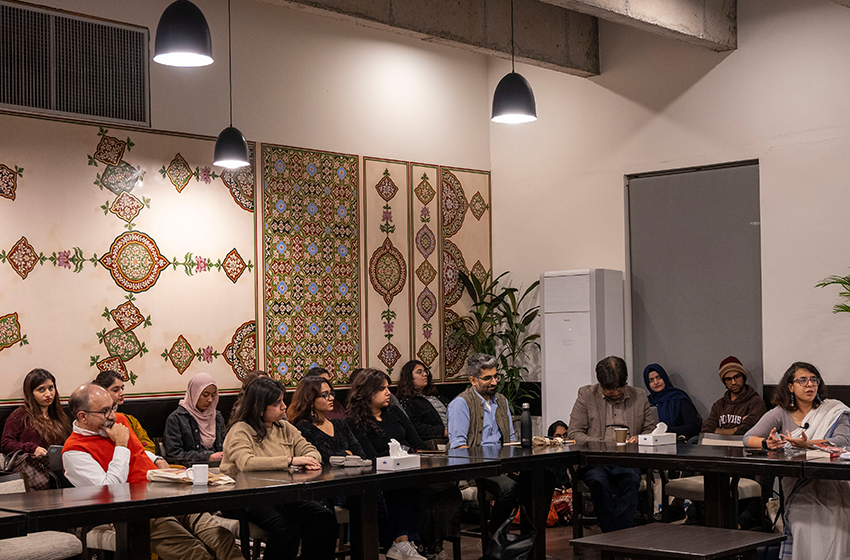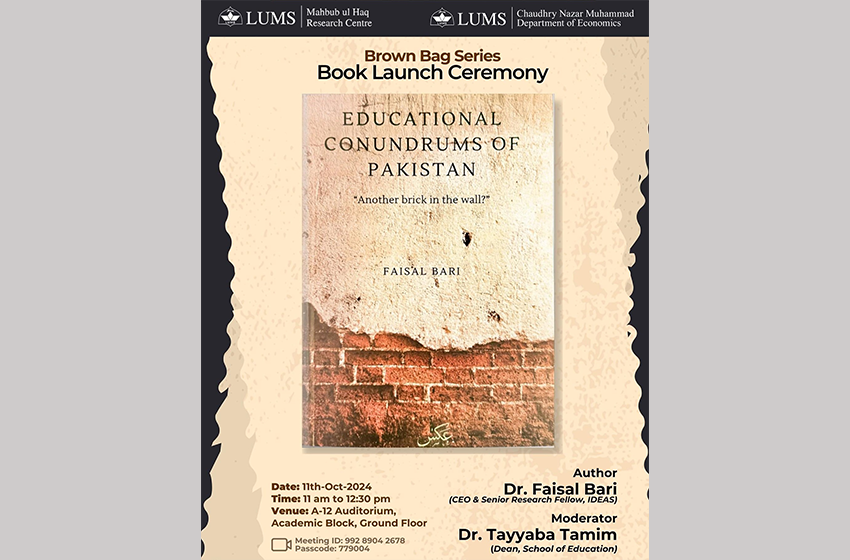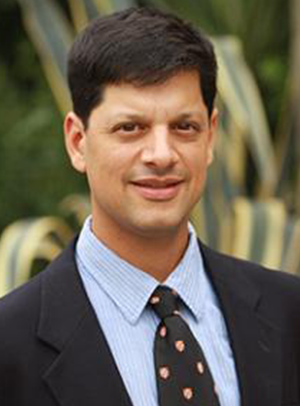
Message from the Dean
Each year brings fresh challenges and new possibilities—alongside a renewed sense of hope for a brighter future. At the Mushtaq Ahmad Gurmani School of Humanities and Social Sciences (MGSHSS), we believe that this future rests with the youth of our nation. Our commitment to nurturing thoughtful, critical, and creative thinkers who can engage meaningfully with the world remains steadfast. The School’s vision has always been to graduate students who not only explore ideas deeply and express them effectively but who also contribute positively to society in Pakistan and beyond. This vision is at the heart of our 2025–2030 Strategic Plan, which guides much of our work this year.
2025 has been a particularly vibrant year for academic activity. Both departments hosted their annual flagship conferences—Path2Development and the HSS Annual Conference—drawing scholars from across Pakistan and around the world. The HSS seminar series continued to thrive, attracting established international academics and emerging voices presenting cutting-edge research.
A highlight of the year was our collaboration with Yale University and the Lahore Biennale Foundation to host the Climate Congress, a landmark event in interdisciplinary climate discourse. In addition, the School organised a wide range of workshops and collaborations on topics including Partition, Education, Data Science, Speculative Fiction, and capacity building for underrepresented scholars in Asia. These initiatives reflect the School’s growing intellectual reach and commitment to scholarly inclusion.
Our public engagement efforts have also expanded. The Unpacking Pakistan podcast (Humanities and Social Sciences) and the Policy Pulse podcast (Chaudhry Nazar Muhammad Department of Economics) continued to engage diverse audiences in timely discussions on climate change, populism, elections, cricket, and youth economic inclusion.
This year also marked a milestone in our academic offerings. We are proud to launch two new and much-anticipated majors: Psychology and Economics, Data and Computer Science, both commencing in Fall 2025. These interdisciplinary programmes have already attracted significant interest and applications, enhancing the overall quality and competitiveness of our incoming cohorts.
Faculty across MGSHSS remain at the forefront of research on Pakistan, producing influential and internationally recognised work in the humanities, social sciences, and economics. This is reflected in the growing number of prestigious fellowships and awards secured by our scholars.
Our students continue to make us proud—whether through exceptional academic placements or competitive scholarships. This year, MGSHSS celebrates its third Rhodes Scholar in the past decade, and its second in just three years. On the job market, our graduates continue to secure impactful roles across sectors, contributing meaningfully to society.
The year was not without its trials. The worst smog season in recent memory disrupted our Fall semester, and a brief but intense conflict with India in the Spring created further uncertainty and dislocations. Yet through it all, our faculty, staff, and students demonstrated remarkable resilience and resolve.
On a personal note, 2025 marks my 20th year at LUMS. I feel deeply honoured and humbled to have contributed to this unique institution and to witness the progress that it has made over the years. In collaboration with all our peer Schools and our extraordinary students, I believe we have taken significant steps this year toward ensuring a sustainable and forward-looking future for LUMS.
Dr. Ali Khan
Bilquis Dawood Chair and Dean,
Mushtaq Ahmad Gurmani School for Humanities and Social Sciences
Highlights
0
Seminars
0
Conferences
0
Workshops
0
Book Launches
0
Journal Publications
0
Awards, Achievements,
Fellowships, and Grants
0
Book Chapter
Publications
0
In the Press and Op-eds
Academic Conferences and Events
Annual HSS Conference: ‘Traditions and Transitions: New Directions in the Study of Islam and Society in South Asia’
The annual Humanities and Social Sciences (HSS) Conference was held from April 18-20, 2025. It brought together 45 speakers from 22 institutions across Pakistan, South Asia, Europe, and North America. Over the course of three days, the conference featured 8 panels, a keynote session, and culminated in a captivating performance by The Fakirs of Bhit Shah. The conference aimed to foster a richer understanding of the variety of Islamic traditions and their lived expressions in South Asia, as well as the relationship between Islam and other religions.
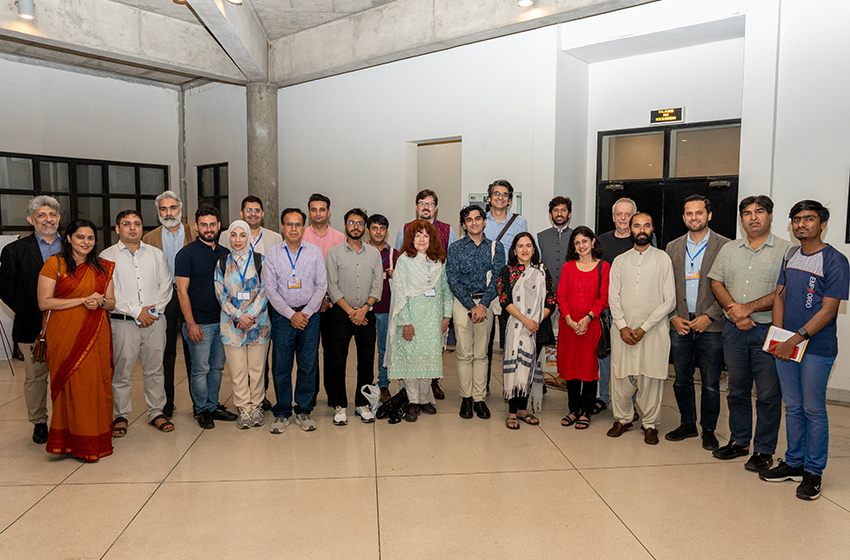
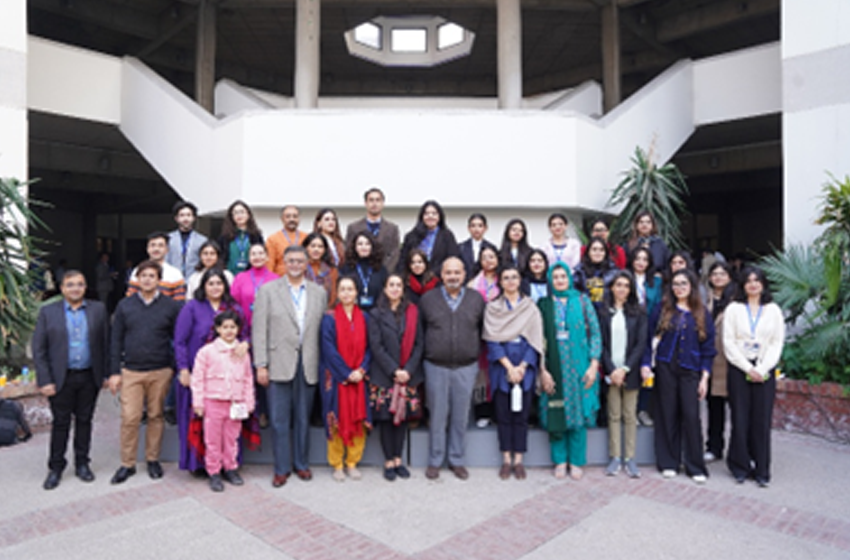
Path2Dev Conference
The Pathways to Development Conference 2024 convened distinguished policymakers, academics, and development practitioners from December 16-18, 2024. Day 1 opened with a plenary session on “Climate Justice: Legal and Policy Challenges in the Face of a Climate Emergency,” featuring Justice Syed Mansoor Ali Shah (Supreme Court of Pakistan), Saad Gulzar (Princeton University), and Maira Hayat (University of Notre Dame).
Lahore Biennale 03: Climate Congress
Held from November 2–8, 2024, the Climate Congress was a major intellectual and artistic event hosted in collaboration with the Lahore Biennale Foundation and supported by the Getty Foundation. Convened by Iftikhar Dadi and John Tain, this gathering extended the themes of the Biennale by fostering South-South dialogues on the role of arts and humanities in addressing the climate crisis. MGSHSS faculty actively participated in conversations, workshops, and collateral events centred on sustainability and cultural activism.
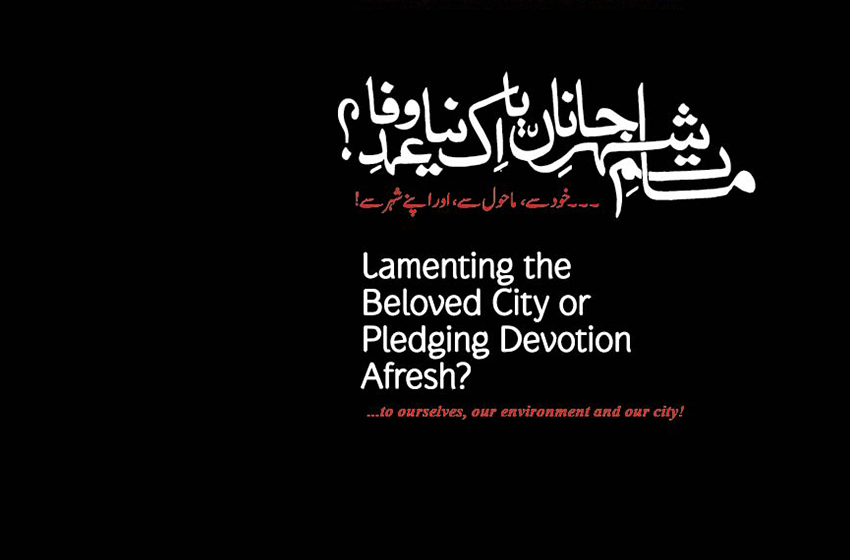
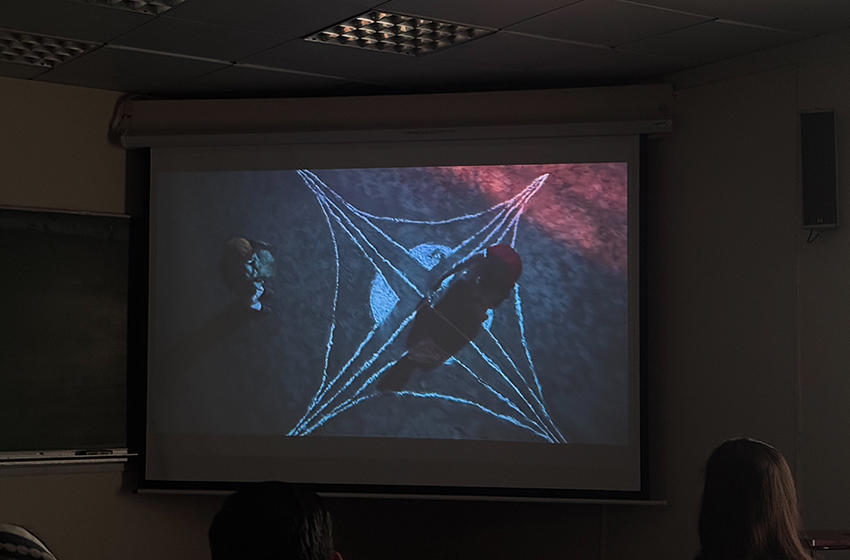
CLCA Spotlight Series
The Comparative Literature and Creative Arts (CLCA) programme held a series of curated screenings exploring emerging storytelling forms in South Asia with a focus on animation this Spring semester. Highlights included screenings of Swipe and Shehr-e-Tabassum by Puffball Studios, and The Marblous Four, a Punjabi fantasy series. These sessions, featuring creators Arafat Mazhar and Haseeb Rehman, unpacked the intersections of narrative, technology, and cultural memory.
LUMS English Symposium: The Matter of the Humanities
Organised by Dr. Tom Sewel and Dr. Farah Hasan Ali, the English Symposium convened scholars from six institutions to examine the value of the humanities in shaping ethical, imaginative, and critical discourse in Pakistan. Featuring keynote addresses by Dr. Amina Yaqin and panels on posthumanism, decolonisation, and pedagogy, the event marked a significant moment for regional collaboration in humanities education.
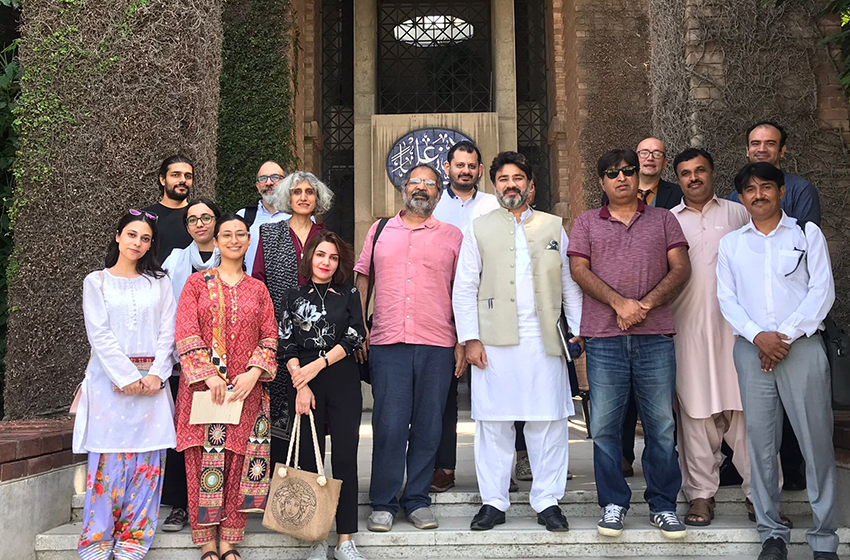
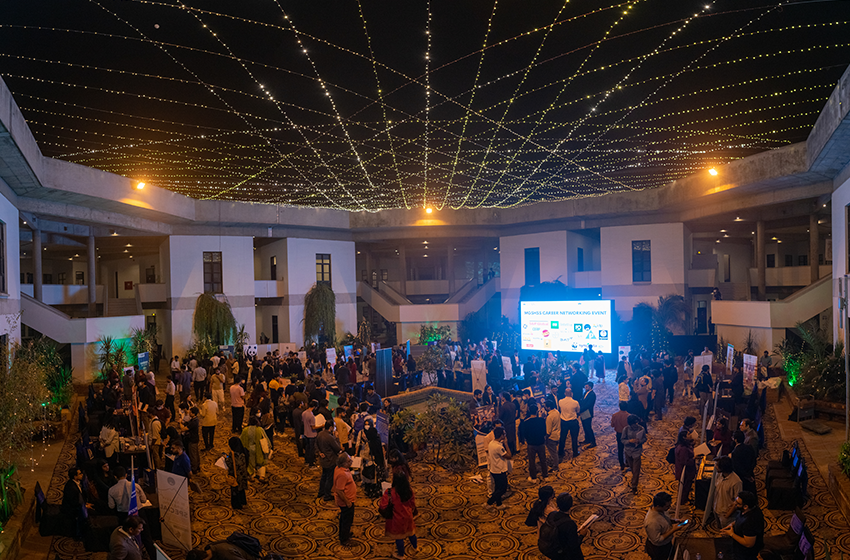
MGSHSS Networking Event 2024
Organised by the MGSHSS Career Centre and LUMS Career Services, this event connected students with leading employers such as Jazz, S&P Global, British American Tobacco, and Teach for Pakistan. Dean Dr. Ali Khan opened the event with a dialogue on career readiness and graduate trajectories in the humanities and social sciences.
Gurmani Centre for Languages & Literature Annual Conference Tashkīl-e-Ilm aur Lisānī Siyāsat: aik tārīkhī aur siyāsī muḥākmah
The Gurmani Centre for Languages and Literature at LUMS hosted its annual conference on May 17, 2025, titled “تشکیل علم اور لسانی سیاست: ایک تاریخی اور سیاسی محاکمہ” (The Formation of Knowledge and Language Politics: A Historical and Political Inquiry). This interdisciplinary gathering brought together scholars and researchers from across Pakistan to explore the relationship between colonial knowledge systems, linguistic politics, and the formation of literary canons in South Asia.
LUMS Economics Conference
The Chaudhry Nazar Muhammad (CNM) Department of Economics and The Economics Society at LUMS hosted the one-day LUMS Economics Conference on May 2, 2025. The event convened leading economists, policymakers, and students to address Pakistan’s pressing macroeconomic and human-capital challenges. Two expert panels— “Macroeconomic and Fiscal Pressures in Pakistan” and “Sustainability and Human Capital Development”—featured Dr. Ishrat Husain, Dr. Ijaz Nabi, Dr. Zehra Farooq, Dr. Hamza Ali Malik, Dr. Ahmed Jamal Pirzada, Dr. Asma Hyder, Dr. Faisal Bari, Dr. Durr-e-Nayab, and Dr. Rabea Malik. A concurrent poster session showcased student research, fostering direct engagement and dialogue on policy solutions for sustainable economic growth.
HSS Seminar Series
The HSS Seminar Series, organised each year by the Department of Humanities & Social Sciences, brings together distinguished scholars from diverse fields. In the 2024–25 academic year, the series featured 13 lectures—both by in-house faculty and invited external researchers—covering topics from colonial print culture to contemporary political theory. Below is the list of presentations delivered over the past twelve months:
Markus Daeschel (Royal Holloway): “Secularisation, Modernity, and the Rise of ‘Magic’ in Late Colonial Urdu Print Culture”
Alia Amirali (Quaid-e-Azam University): “Domestic Workers as Political Subjects”
Shafqat Hussain (Trinity College): “The Shangrila Diaries: Foreign Tourists in Hunza Valley”
Farah Hasanali (LUMS): “They Kill Us for Their Sport: Agamben’s Homo Sacer in Mithal Ghazi’s A Feminine Solo”
Feyzullah Yilmaz (LUMS): “Overcoming Nihilism Through Sufism: Muhammad Iqbal and His Philosophy”
Asif Mehmood (NYU-Shanghai): “Order #628: Law, Space, and Coal Power Production at Sahiwal”
Thomas Blom Hansen (Stanford University): “When the Past Is Tense: A Democratic History of Monuments in an Indian City”
Amalie Dueholm (LUMS): “Teaching Queer Desire? Examining the Transformative Pedagogy of Shubh Mangal Zyada Saavdan”
Afiya Zia (Independent Scholar): “Piety, Populism, Post feminism in Pakistan”
Gurmeet Rai (CRCI): “Inclusive Approaches to Preserving Cultural Heritage & Revitalizing Historic Cities”
Tom Sewel (LUMS): “The Fascist Superhero”
Jason Neelis (Wilfrid Laurier University): “Upper Indus Connections between South Asia and Central Asia: Interdisciplinary Research on Pre‐modern Rock Art and Inscriptions in Gilgit‐Baltistan”
Over the course of the year, these seminars not only showcased cutting-edge research but also fostered lively interdisciplinary dialogue—underscoring the School’s commitment to expanding the horizons of humanities and social-science scholarship.
Workshops and Training Initiatives
1947: Canonizing Partition
MGSHSS, in partnership with the Centre for Migration Studies (UBC) and Royal Holloway, University of London—with support from Canada’s Social Sciences and Humanities Research Council—hosted the two-day workshop Re-thinking Methodology in Partition Studies on February 22–23, 2025. Opening remarks by Nadhra Khan (LUMS), Anne Murphy (UBC), and Sarah Ansari (Royal Holloway) set the stage for a series of thematic sessions: “Making Memory,” featuring Yaqoob Khan Bangash and Kamran Asdar Ali; “Memorializing Practices,” with Philipp Zehmisch and Navtej Purewal; “Partition Spatialities,” led by Willem van Schendel and Anne Castaing; and “Technologies of Memory,” showcasing Cecilia Varuzza and Siobhan Lambert-Hurley. Day Two broadened the conversation to “Refocusing Partition Studies” through Sindh-centred research by Ashok Kumar Khatri and Ghazal Asif Farrukhi, and “Visualization” in art and narrative with Sadia Kamran, Khurram/Sadia Safdar, and Quddus Mirza, before concluding with a creative performance session and a closing roundtable chaired by Muhammad Waseem. This interdisciplinary gathering probed new methods for examining Partition’s legacies across memory, media, and material culture.
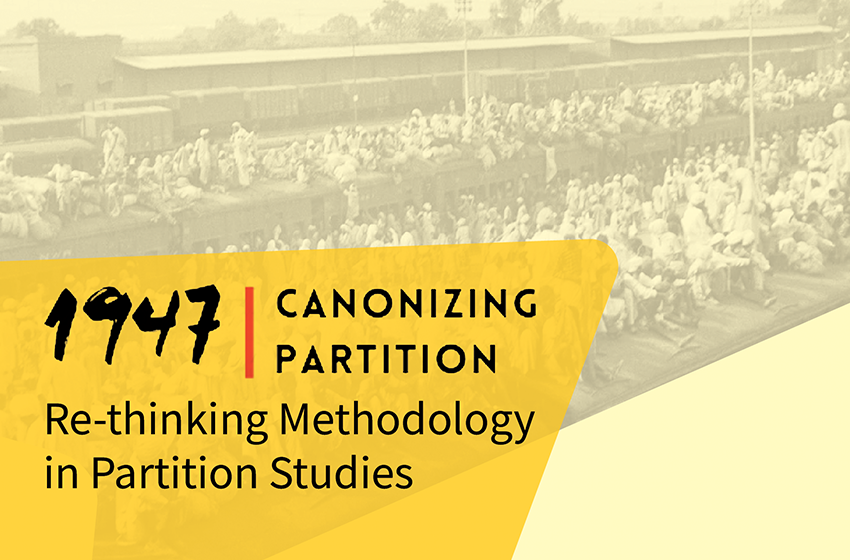

EdJAM Writing Workshop
From September 23–27, 2024, LUMS hosted the Education, Justice and Memory Network for an international writing retreat led by Dr. Tania Saeed and Dr. Sameen Mohsin. Scholars from Uganda, Cambodia, and the UK engaged in collaborative planning, field visits, and a documentary screening to deepen global partnerships around education and memory.
Cultivating the Humanities and Social Sciences and Supporting Underrepresented Scholars of Asia Research and Capacity Building Workshop for Humanities and Social Sciences Faculty (Cohorts 5 & 6)
As part of the "Cultivating the Humanities and Social Sciences and Supporting Underrepresented Scholars of Asia" initiative headed by Association of Asian Studies (AAS) and sponsored by the support of Sweden, the Department of Humanities and Social Sciences at LUMS hosted two intensive Research Methodology & Capacity Building Workshops for early-career faculty from under-resourced institutions across Pakistan. Cohort 5 was held from October 1–5, 2024, and Cohort 6 from May 6–10, 2025. These workshops aimed to enhance participants' research capabilities and professional development through a series of comprehensive sessions.
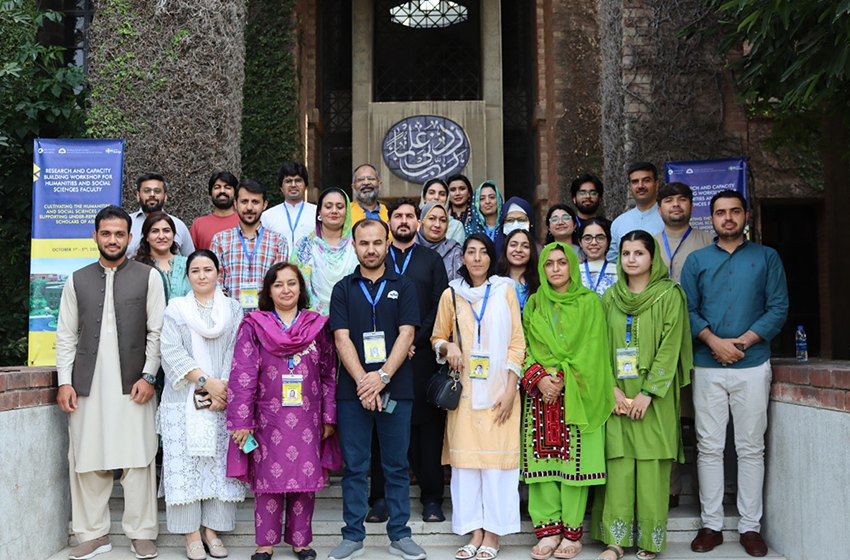
Salam Award Writers Workshop for Speculative Fiction
As part of the Salam Award Writers Workshop for Speculative Fiction, LUMS hosted acclaimed authors Karen Joy Fowler and Robert V.S. Redick in February 2024. Over a two-week residency, they mentored twelve emerging writers from across Pakistan, guiding them through intensive sessions of world-building, drafting, and revision. Participants also attended the Lahore Literary Festival and explored the city for creative inspiration. The workshop fostered a dynamic space for innovation in speculative fiction.
Introduction to Data Analysis using R
The LEAD Lab at the Chaudhry Nazar Muhammad (CNM) Department of Economics conducted a four-day workshop in April 2025, led by Mr. Usman Elahi (Lecturer, CNM Economics). Targeted at LUMS students, research associates, staff, and faculty, the sessions introduced fundamental data analysis techniques using R Studio. Participants engaged with real-world datasets, gained proficiency in data manipulation and visualization, and received a completion certificate to enhance their academic and professional credentials.
Data Science in Economics Workshop
The Lab for Economic Analysis of Data (LEAD) at the CNM Department of Economics hosted a two-day “Data Science in Economics” workshop on January 31–February 1, 2025. Led by alumnus Muhammad Raza Mustafa Khan (University of Delaware), the intensive sessions equipped participants with practical STATA data-analysis techniques and foundational skills for careers or research in data science.
Strategic Initiatives
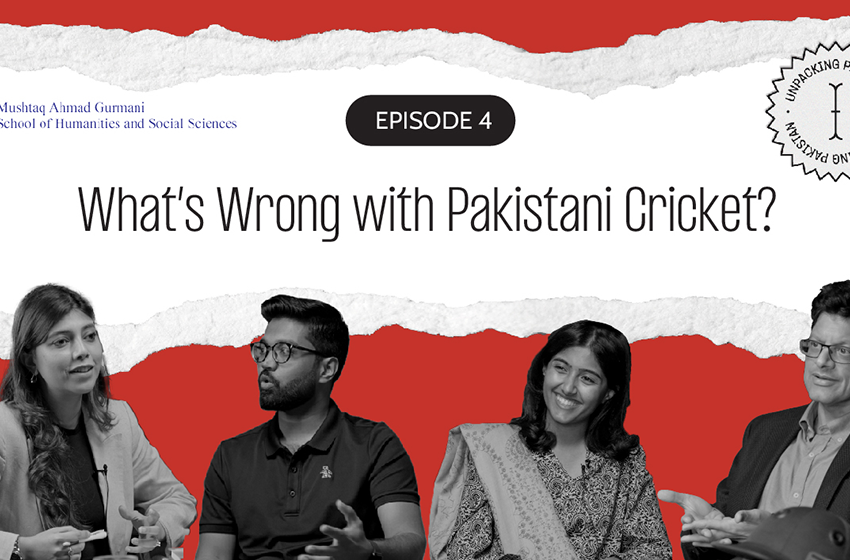
Podcast: Unpacking Pakistan
This podcast series convenes in-depth conversations with the MGSHSS faculty and leading public intellectuals to explore contemporary debates in politics, climate change, gender, literature, and economics. Each episode offers nuanced, research-driven perspectives, bringing academic scholarship into dialogue with pressing national issues.
To date, 4 episodes have been released. The series has collectively garnered over 8,000 views on YouTube.
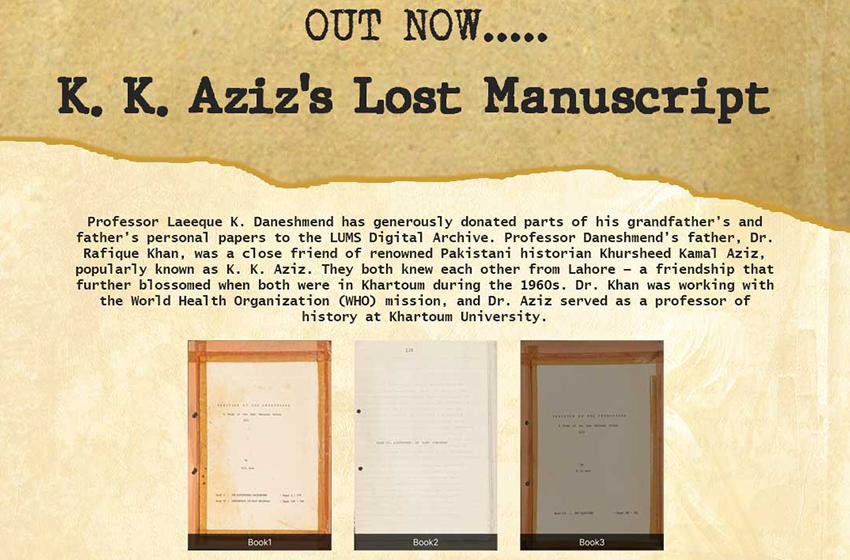
Lutfullah Archives: KK Aziz Manuscripts
The LUMS Digital Archive has made public a rare, unpublished manuscript by historian K.K. Aziz, commissioned by Prime Minister Zulfikar Ali Bhutto. This document, detailing the 1971 political crisis, has added rich material to South Asian historiography.
Podcast: Policy Pulse
Led by the Chaudhary Nazar Muhammad Department of Economics, Policy Pulse launched its first episode with Dr. Faisal Bari on youth economic inclusion. The series aims to bridge academic insights and public policy through faculty-student dialogue.
LUMS Economic Policy Outlook Series
LUMS Economic Policy Outlook Series bridges the gap between technical rigorous research conducted at the Chaudhary Nazar Muhammad Department of Economics, and policy implications of the same. Our policy briefs are developed to reach a wider audience and inform policy design based on empirical findings.
Launching New Majors
MGSHSS introduced a new interdisciplinary major in Psychology, and jointly launched an Economics, Data & Computer Science major with SBASSE. These additions reflect evolving academic interests and future-oriented curricula.
Milestones and Achievements
Faculty
1. Dr. Ilyas Chattha received the prestigious Rangoonwala Visiting Fellowship at the University of Oxford.
2. Dr. Fatima Fayyaz awarded a postdoctoral fellowship by the Lakshmi Mittal and Family South Asia Institute at Harvard University.
3. Dr. Asma Faiz received the Charles Wallace Fellowship for Pakistan for 2025.
4. Mr. Zahid Hussain (Writer-in-Residence) received the Afzal Ahsan Randhawa Award and has also previously won the Dhahan International Canada Award.
5. The book Lahore in Motion, published by UCL Press, featured 14 chapters by MGSHSS faculty and alumni on urban change through the lens of the Orange Line metro.
Students
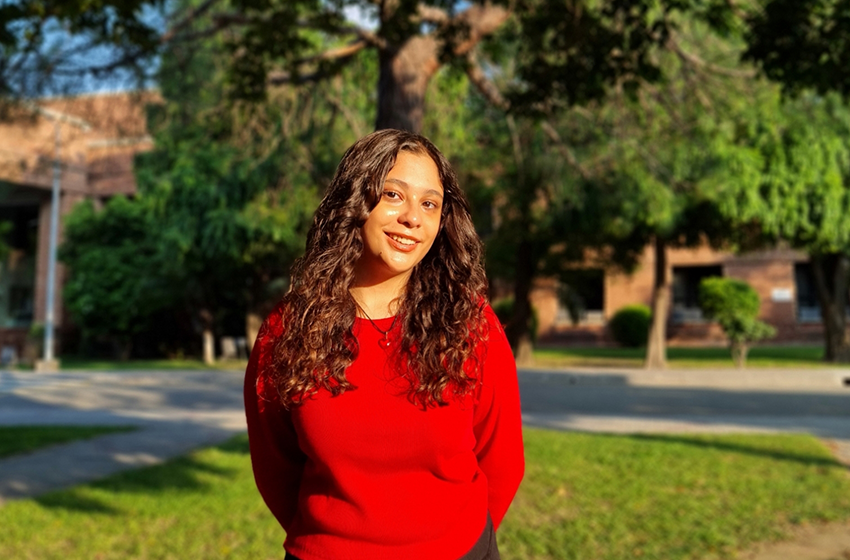
Injeel Abdul Aziz (BSc ’24) received the UCL Global Master’s Scholarship to pursue her graduate studies
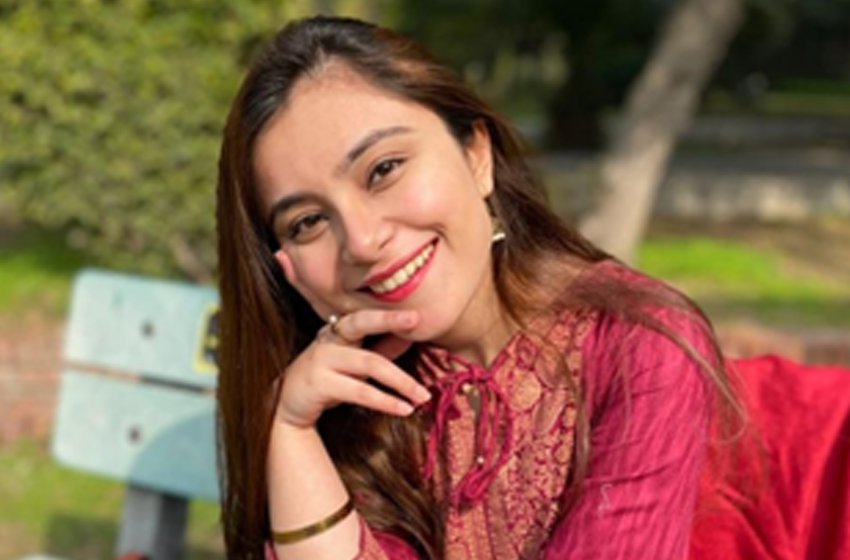
Amna Shahid (BSc ‘23) enrolled in Columbia University's Master’s in Quantitative Methods as a Fulbright Scholar and received additional offers from Oxford, NYU, and others
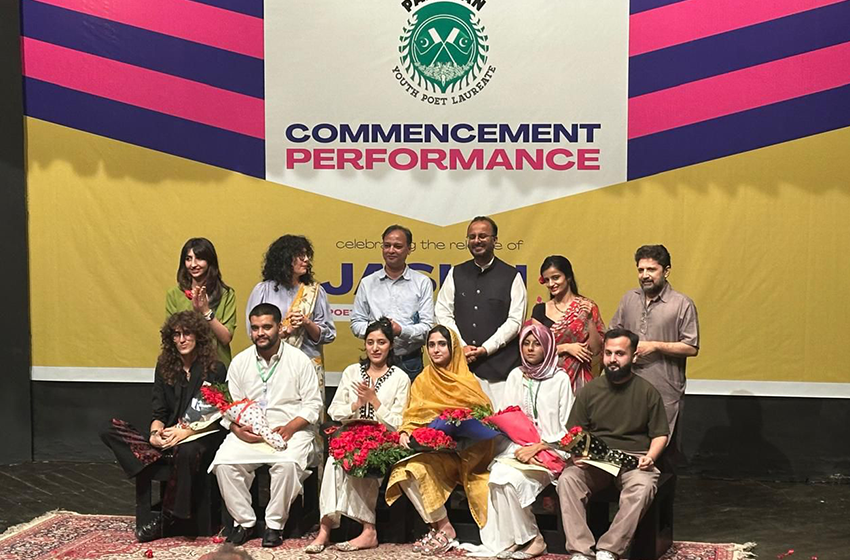
At the inaugural Pakistan Youth Poet Laureate event, Zain ul Abidin Khan Alizai (BSc ‘24), Sherdil Awais Rashid (BA ’27), Rumaisa Maryam Samir (BA ’27), and Ayesha Owais were recognised for their original poetry, guided by faculty mentors Tom Sewel and Younis Bin Azeem.
Hadi Ameer (BS ’23) won the Hugh Owen Prize for best undergraduate thesis from the South Asian Studies Association of Australia
Mahnoor Gul (BA ‘26) led LUMUN to win Outstanding Delegation at Harvard MUN 2024 as its first female captain
Shaheryar Hussain (BSc '22) began his M.A. at NYU on a Fulbright Scholarship with a full tuition waiver. He was also accepted to LSE and Cornell
Muhammad Tabish Hamid (BSc ’24), President of LPRI, represented Pakistan at the 25th International AIDS Conference in Munich, leading a workshop and presenting a paper on HIV and disaster response frameworks
Dua Zahra (BA ‘24) admitted to Harvard Divinity School with full funding
Jovera Shakeel (BSc ‘25) selected as the Rhodes Scholar-Elect 2025 for Pakistan
Publications
Books
- Bari, F. B. (2024). Educational Conundrums of Pakistan: Another Brick in the Wall. Lahore: AKS Publications. ISBN 978-9697312368; 560 pp.
- Tanweer, B. (2025). The Boy Who Thought He Was A Car. Ilqa Publications.
- Otto, M., & Saeed, T. (Eds.). (2024). Critical Perspectives on Refugee and Migrant Integration in Education: Grassroots Narratives from Multiregional Settings. UK: Bloomsbury. (Open Access)
- Jaffer, A. (2025). The Social Life of Islam: Sufi Shrines in Urban Pakistan. New Delhi: Cambridge University Press.
Book Chapters
- Khan, A. (2024). Indo-Pak Cricketing Relations in the Shadow of the Rise of Hindutva. In Cricket and Nationhood in the Twenty-First Century: Identity Projects in Uncertain Times. Oxford University Press.
- Rahman, T. (2025). Class Struggles and Political Islam in Pakistan. In Pande, A. (Ed.), Routledge Handbook on Pakistan (2nd ed.). Routledge.
- Saeed, T. (2024). Identity, Rituals and Religion: Reflections on Sufism and the Quest for Global Citizenship Education From a South Asian Perspective. In Lim, H. M., Ji, S., & Lee, Y. Y. (Eds.), Rethinking Global Citizenship Education from Asia-Pacific Perspectives. APCEIU UNESCO.
- Khan, N. S. (2025). Architecture: Lahore. In Jacobsen, K. A., Malhotra, A., Myrvold, K., & Nesbitt, E. (Eds.), Brill’s Encyclopaedia of Sikhism (Vol. II, pp. 67–77). Brill.
- Rahman, T. (2025). A Critical Analysis of Pakistan Female Labour Force Participation. In Mukherjee, A., & Rahman, A. (Eds.), Women and Work in South Asia. FES Bangladesh.
Journal Publications
- Waseem, M. (2024). Islamic constitutionalism in Pakistan. Arab Law Quarterly, 38(4), 446–465. https://doi.org/10.1163/15730255-bja10165
- Waseem, M. (2024). The federal project in Pakistan: Beyond fixing the design. Commonwealth & Comparative Politics, 62(3), 206–228. https://doi.org/10.1080/14662043.2024.2393444
- Jaffrelot, C., Waseem, M., & Faiz, A. (2024). Mapping the post-18th Amendment federalism in Pakistan: Hegemony, centralization or cooperation? Commonwealth & Comparative Politics, 62(3), 185–205. https://doi.org/10.1080/14662043.2024.2419688
- Faiz, A. (2024). Intergovernmental relations in Pakistan: Managing the federation–Sindh contestation. Commonwealth & Comparative Politics, 62(3), 229–248. https://doi.org/10.1080/14662043.2024.2389638
- Majid, H., Khalid, R., Saeed, R., Faheem, A., & Lemanski, C. (2025). Spatializing women’s everyday access to energy: An intra-urban comparison of the gender–energy nexus in Lahore, Pakistan. International Journal of Urban and Regional Research. https://doi.org/10.1111/1468-2427.13311
- Ali, A., Ahmad, H. F., Meeks, R. C., Plutshack, V., Wang, Z., & Younas, J. (2024). Breaking the culture of nonpayment: A qualitative analysis of utility intervention in Pakistan. Utilities Policy, 91, Article 101850. https://doi.org/10.1016/j.jup.2024.101850
- Bari, F. B., & Malik, K. Z. (2024). Asset-based microfinance for microenterprises: Evidence from Pakistan. American Economic Review, 114(2), 534–574.
- Ali, F. B. (2025). Do institutions matter? Taxation and state formation in Pakistan. Canadian Journal of Development Studies / Revue canadienne d’études du développement. https://doi.org/10.1080/02255189.2025.2454697
- Muhammed, I. A., Khalid, A. M., & Premaratne, G. (2025). How influential are digital technologies on good governance and quality institutions in ASEAN. Bulletin of Monetary Economics and Banking.
- Sameer, M., Malik, K. Z., & Gulzar, R. (2025). Spatial and temporal analysis of land-use/land-cover changes in Sargodha District, Punjab. Advance Social Science Archive Journal.
- Muhammed, I. A., Khalid, A. M., & Premaratne, G. (2024). Implications of digital finance policies and informality on firms’ financial uncertainties in developing countries. Studies in Economics and Finance.
- Sufrizul, M., Khalid, A. M., & Premaratne, G. (2024). Infrastructure, trade and connectivity: Evidence from the Belt and Road Initiative. China Economic Journal. https://doi.org/10.1080/17538963.2024.2334108
- Goldsmith, A. H., Rajaguru, G., & Khalid, A. M. (2024). Family rules, employment, fertility and women’s empowerment: Evidence from a developing country. Journal of Economic Analysis.
- Muhammed, I. A., Khalid, A. M., & Premaratne, G. (2024). Informal economy, Islamic finance development, and sustainable development in Muslim-majority countries. Journal of Islamic Monetary Economics & Finance.
- Weidmann, B., Vecci, J., Said, F., Deming, D. J., & Bhalotra, S. R. (2024). How do you find a good manager? NBER Working Paper Series.
- Afzal, U., d’Adda, G., Fafchamps, M., Quinn, S., & Said, F. (2024). Demand for commitment in credit and saving contracts: A field experiment. The Economic Journal.
- Ahmed, H., Mahmud, M., Said, F., & Tirmazee, Z. (2024). Encouraging female graduates to enter the labor force: Evidence from a role model intervention in Pakistan. Economic Development and Cultural Change, 72(2).
- Majid, H., & Shami, M. (2024). Unpacking rural-urban clientelist networks. Oxford Development Studies.
- Majid, H., & Shami, M. (2024). Targeting the centre and (least) poor: Evidence from urban Lahore, Pakistan. Urban Studies.
- Majid, H. (2024). Public goods, productivity, and economic inequality. In Baikady, R., S. M. S., Nadesan, V., Islam, M., Przeperski, J., & Jianguo, G. (Eds.), The Palgrave Handbook of Global Social Problems. Palgrave Macmillan.
- Ali, A. (2024). Toolbox of individual-level interventions against online misinformation. Nature Human Behaviour.
- Ali, A. (2024). Down to the wire: Leveraging technology to improve electric utility cost recovery. EEG Applied Research Programme on Energy and Economic Growth, Oxford Policy Management.
- Hussain, Z. (2024). The effects of a tax-financed government spending. RASTA Policy Brief, PIDE.
- Iftikhar, M. H. (2024). Qaddafi’s downfall in Libya: When the tough doesn’t get going. Contemporary Arab Affairs, 17(2), 321–346. https://doi.org/10.1163/17550920-bja00039
- Alvi, A., & Werth, L. (2024). Generosity as Ethics: The Double Transaction in Marcel Mauss’s The Gift. Current Anthropology, 65(6), 1010–1027.
- Zulfiqar, S. (2024). Leila Aboulela, Islam, and the trajectory of the African novel. Journal of Postcolonial Writing, 60(5), 578–590. https://doi.org/10.1080/17449855.2024.2415671
- Syed, B. H. (2024). Ibn Khaldūn’s reception in colonial South Asia. Journal of the Royal Asiatic Society, 34(4), 729–743. https://doi.org/10.1017/S1356186324000191
- Imtiaz, M. S., Dizon, F., & Yu, J. (2025). Identifying the impact of water constraints on agricultural productivity in hillside contexts. Agricultural Economics. https://doi.org/10.1111/agec.12866
- Bari, F. B., & Malik, K. Z. (2024). Book Review: The Rise of Central Banks: State Power in Financial Capitalism. Review of Radical Political Economics. https://doi.org/10.1177/04866134241302353
- Bari, F. B., & Malik, K. Z. (2024). Capitalism’s Double-Edged Sword: A Review of Two Recent Books About Central Banks. Review of International Political Economy. https://doi.org/10.1080/09538259.2024.2449494
Press/Other Publications
- Dueholm, A. G. (2024). A Vision of Modern India: Social Messages and Commodity Culture in New Bollywood. MoMA Post.
- Shahzad, F. (2024, September 25). How the hidden curriculum in English textbooks shapes minds. The Express Tribune.
- Khosa, S. (2024, August 5). Lahore’s Challenge. Dawn.
- Saleemi, N. (2024). After 77 years of independence, Pakistan’s society, economy and politics are still marked. D+C Development and Cooperation.
- Shahzad, F. (2024, August 22). Celebrating accentedness. The Nation.
- Imtiaz, H. (2024). At the Dining Table. Homesick E-Zine, Intifada Issue (April 25).
- Shahzad, F. (2024, August 17). Breaking chains. The Nation.


